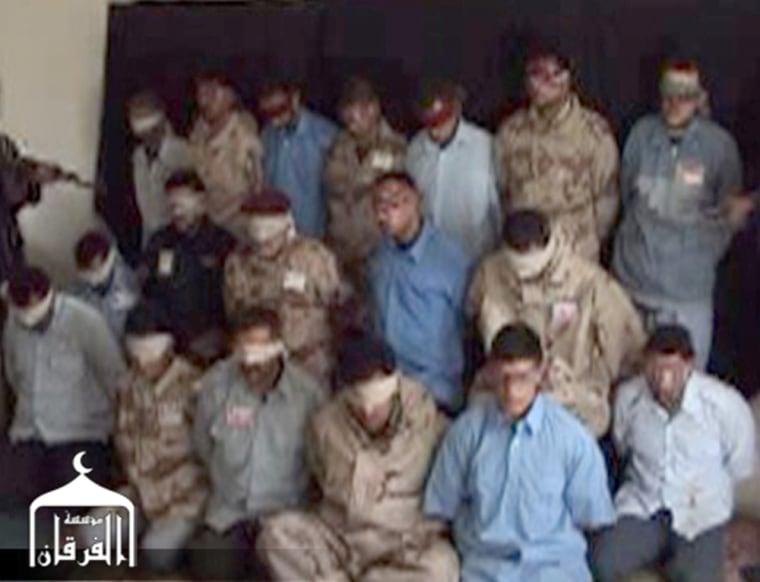An al-Qaida-linked Sunni group said Friday that it kidnapped 18 government workers and soldiers in retaliation for the alleged rape of a Sunni woman by members of the Shiite-dominated police force. Hours later, the government said the bodies of 14 security officers had been found.
The Islamic State of Iraq, an al-Qaida linked Sunni group, posted a statement on the Internet earlier Friday saying 18 men were kidnapped in retaliation for the alleged rape of a Sunni woman by members of Iraq’s Shiite-dominated police force.
"This blessed operation is a response to crimes carried out by those infidels in their fight against the Sunnis," the statement said. "The latest of the crimes committed by these traitors was to rape our sister in religion."
Meanwhile Thursday, a roadside bomb exploded alongside the convoy of a prominent Shiite cleric whose high-level political ties have made him the target of past assassination attempts. The imam was not injured, but several bodyguards were wounded.
The attack against Jalal Eddin al-Sagheer, who is also a leading member of Iraq's parliament, came on one of Baghdad's quietest days in months, with one reported car bombing and one fatality.
U.S. and Iraqi forces also neared agreement to expand the Baghdad security sweep into the Shiite stronghold of Sadr City. Such a move would test the willingness of the powerful Mahdi Army militia to grant its American foes access to all parts of Baghdad under its control.
Security challenges
The relative lull in violence offered authorities a rare breather after periods of almost hour-by-hour bombings and mortar strikes by suspected Sunni insurgents.
But the calm was broken after nightfall. The rumbling of artillery fire was heard throughout Baghdad.
In recent days, U.S. gunners have pummeled areas of south Baghdad used as suspected staging ground for car bombings and other attacks.
There was no immediate word from the military on the latest apparent barrage. Residents said the shelling was concentrated on the mostly Sunni area of Dora.
The barrage highlighted the enormous security challenges of a planned international conference on ways to rebuild and stabilize war-weary Iraq. The gathering hopes to bring together a broad range of Western and Islamic nations, including the United States and pivotal Iraq neighbors Syria and Iran.
Al-Sagheer, an ally of Prime Minister Nouri al-Maliki, told The Associated Press his convoy was attacked in a Sunni area of southwest Baghdad while en route from the airport.
"They targeted me again," he said, but declined to point the finger at any specific group. He said several bodyguards were wounded.
Al-Sagheer has had close calls in the past, which he said were linked to his denunciations of Sunni insurgents and foreign jihadists such as al-Qaida in Iraq.
In June 2006, a shoe bomber killed 10 people during prayers in his mosque in northern Baghdad. Two months earlier, suicide attackers killed at least 85 people as they left the mosque.
A U.S.-led security operation launched Feb. 14 seeks to reclaim Baghdad's lawless streets.
Fear of Sadr City
So far, the Shiite stronghold of Sadr City has proven to be one of the most complex pieces of the puzzle.
The Mahdi Army militia, led by radical cleric Muqtada al-Sadr, pulled backed under intense government pressure to allow the security plan to proceed. But the U.S. and Iraqi forces have cautiously avoided storming into Sadr City, fearing al-Sadr could suddenly withdraw his tacit cooperation.
A meeting between Sadr City political leaders and a joint U.S.-Iraqi military delegation studied plans to establish an "operational base" in the district, said Rahim al-Daraji, one of Sadr City's two mayors.
"We discussed ways to coordinate ... and define the movements of these troops," he said. However, he said continued pinpoint U.S. raids in Sadr City were violations of the possible agreement.
